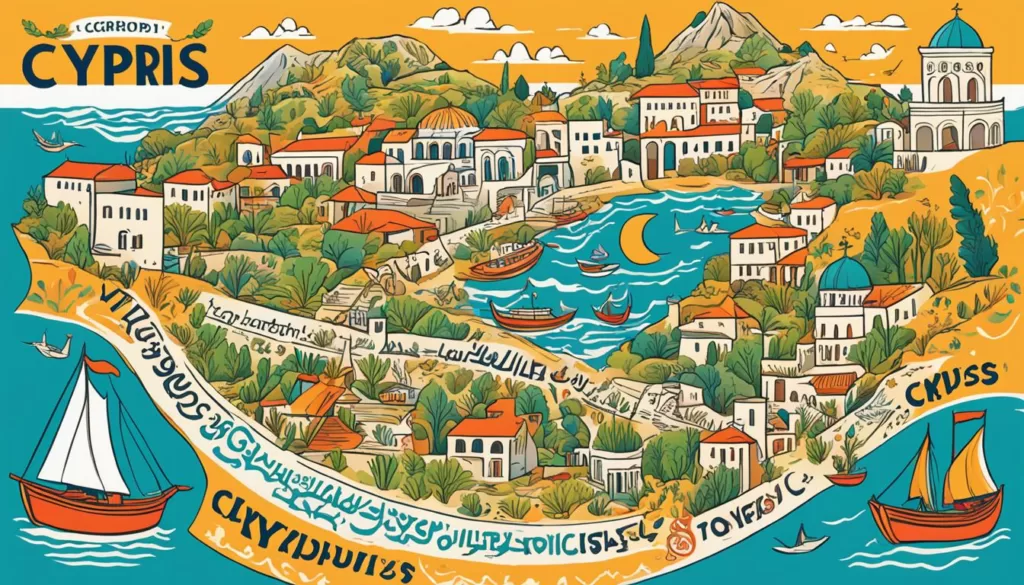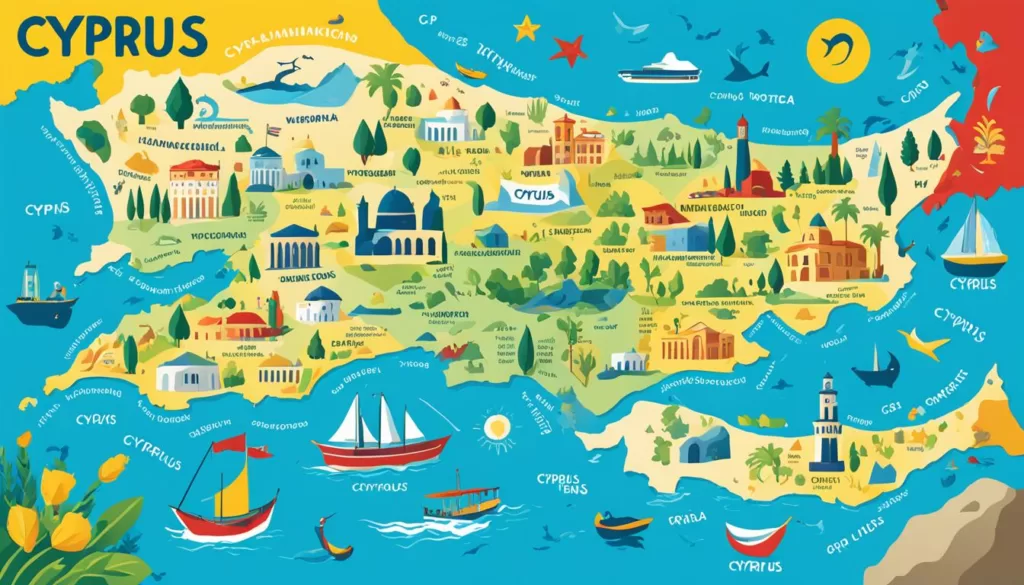The Republic of Cyprus is a linguistic mosaic, rich with history and cultural diversity. In this Mediterranean haven, the spoken word forms an intricate web of communication and identity. The official Cyprus language designations may only highlight Greek and Turkish, but beneath this surface lies a broader spectrum of Cypriot languages utilized every day by its citizens. From the bustling streets of Nicosia to the serene coastlines of Paphos, the languages spoken in Cyprus echo the island’s multicultural legacy and modern vitality.
Langauges serve not only for bureaucratic purposes but also thread the societal fabric with the vernacular dances of Cypriot Greek and Cypriot Turkish. Alongside these, recognized minority tongues like Armenian and Cypriot Arabic, as well as the less familiar Kurbet language, add color and texture to the country’s linguistic landscape. With the prevalence of English and other foreign tongues, Cyprus stands as a witness to the past and a participant in the global dialogue.
Key Takeaways
- Official languages of Cyprus are Greek and Turkish, both steeped in the island’s history.
- Cypriot Greek and Cypriot Turkish constitute the vernacular, each with distinct characteristics.
- Minority languages such as Armenian and Cypriot Arabic are recognized and preserved.
- English is a widely spoken foreign language, highlighting Cyprus’s adaptability and educational emphasis on language learning.
- The linguistic diversity of Cyprus is a testament to its historical crossroads and cosmopolitan fabric of society.
An Overview of the Official Languages of Cyprus
The Mediterranean island of Cyprus is as rich in linguistic diversity as it is in cultural heritage. The official languages of Cyprus, Greek and Turkish, are integral to the nation’s identity, serving as a bridge between its storied past and its dynamic present. Drawing from ancient roots and regional influences, these languages encapsulate the essence of Cyprus’s enduring legacy.

The Greek Language: A Connection to Antiquity
The Greek language Cyprus is not just one of the official tongues but a living chronicle of the island’s extensive history. Originating from settlers in the late second millennium BCE, the Greek language resonates through time, from the inscriptions of antiquity to the conversations on the streets today. In Cyprus, where approximately 80.9% of the population communicates in Greek, it is cherished not only as a medium for administration and education but also as a vessel of collective memory and cultural expression.
Turkish in Cyprus: A Language Divided by Borders
In contrast to its Greek counterpart, the Turkish language Cyprus reflects a different facet of the island’s complex past. With its foundations in Ottoman history, Turkish maintains a prominent presence in the Turkish-speaking northern part of Cyprus. This linguistic partition, shaped by geopolitical events, has culminated in a unique dialect that threads through the Turkish Cypriot community, sustaining a vibrant connection to their heritage while standing distinct from the Turkish dialects of Anatolia.
- Official Languages: Greek and Turkish
- Percentage of Greek Speakers: 80.9% in Republic-controlled areas
- Influence on Dialects: Evolution and mutual influence of Cypriot Greek and Turkish
- Usage: Administrative, educational, and cultural communications
Both Greek and Turkish endure not just in their standard forms utilized for formal endeavors but in their Cypriot dialects, deeply embedded in the everyday lives of the locals. Each language perpetuates its own narrative, contributing to the rich tapestry that makes Cyprus a unique confluence of civilizations.
The Everyday Vernacular: Cypriot Greek and Cypriot Turkish
In the heart of the Mediterranean, the spoken languages in Cyprus play a critical role in comprehending the island’s social and cultural tapestry. Among these, Cypriot Greek and Cypriot Turkish stand out, defining everyday life and fortifying the regional identity. The vernacular languages of Cyprus, with their rich histories and distinct evolutions, are much more than mere tools for dialogue; they embody the spirit and heritage of their communities.

Cypriot Greek: Dialectal Distinctiveness
The vernacular Cypriot Greek, with its Byzantine roots, diverges distinctively from the Standard Modern Greek (SMG) in several respects. Its pronunciation, grammar, and lexicon bear the marks of a language that has evolved autonomously, leading to a version of Greek that may confuse even Hellenic speakers from other regions. This rich linguistic variety, spoken by the majority in the Republic-controlled areas, not only facilitates daily communication but also weaves a connection to the deep historical narrative of the island.
Cypriot Turkish: A Blend of Influences
Parallel to its Hellenic counterpart, Cypriot Turkish boasts its own unique set of characteristics. This language, rooted in Ottoman Turkish and modified by the dialectal traits of the Yörük people from the Taurus Mountains, embraces elements from Greek, Italian, and English influence. Despite these additions, Cypriot Turkish remains mutually intelligible with the Turkish language spoken in Turkey, reflecting both historical ties and a contemporary adaptation to the linguistic landscape of Cyprus.
| Language | Region | Unique Features | Mutual Intelligibility |
|---|---|---|---|
| Cypriot Greek | Republic-controlled areas | Evolved phonology, morphology, vocabulary | May be difficult for other Greek dialect speakers |
| Cypriot Turkish | Primarily North Cyprus | Influences from Greek, Italian, English | Mutually intelligible with Standard Turkish |
The vernaculars of Cyprus, Cypriot Greek and Cypriot Turkish, do more than facilitate everyday communication—they’re the living embodiments of Cyprus’s diverse history and cultural fusion. As one navigates the streets of Cyprus, the spoken language encapsulates the duality of its Greek and Turkish influences, harmonizing to form the distinctive voice of the island nation.
Understanding the Minority Languages in Cyprus
The cultural fabric of Cyprus includes a medley of languages that extend beyond its official ones, delving into the realm of Cypriot minority languages. These languages not only enrich the island’s culture but also personify its diverse heritage. Within this linguistic diversity, two languages stand out for their historical significance and contemporary relevance: the Armenian Cypriot language and the Cypriot Arabic language.
The Armenian Cypriot language serves as a cultural beacon for around 3,000 individuals, with a lineage tracing back to the sixth century. Augmented by survivors of the Armenian genocide in the 20th century, this language has maintained its presence and continues to be an important aspect of the Armenian community in Cyprus. In stark contrast, the Cypriot Arabic language finds itself on the brink of fading away, spoken predominantly by the aging Cypriot Maronite community. In the face of such challenges, the significance of these languages within the Charter for Regional or Minority Languages becomes all the more imperative for their preservation and appreciation.
Jaunting outside the realm of official recognition, another language breathes life into the mosaic of Cyprus’s lexicon — Kurbetcha. This language, with its roots in the Romani vocabulary and the grammatical structure of Cypriot Turkish, is little-explored and yet embodies the expansive cultural landscape of the island, particularly within the Cypriot Roma community residing in Northern Cyprus.
| Language | Est. Speakers | Cultural Significance | Preservation Status |
|---|---|---|---|
| Armenian | ~3,000 | Symbol of cultural resilience | Recognized and supported |
| Cypriot Arabic | ~900 | Vital for Maronite identity | Risk of becoming moribund |
| Kurbetcha | Unknown | Represents Cypriot Roma heritage | Unrecognized, under-studied |

Evidence of Cyprus’s dedication to its linguistic treasure can be seen through educational efforts and community initiatives that strive to keep these languages alive for future generations. The Armenian language flourishes within Armenian schools, and strenuous efforts are directed toward revitalizing the declining Cypriot Arabic, highlighting a commitment to safeguarding this linguistic diversity as a cherished aspect of the Cypriot heritage.
Languages Spoken Cyprus: A Look at Bilingualism Among Cypriots
Cyprus, an island where heritage and culture converge, showcases a remarkable interplay of languages that attest to its storied past and vibrant present. The phenomenon of bilingual Cyprus is not just a testament to the island’s history of occupations and governance but also to its contemporary embrace of multiculturalism and global connectivity. The spectrum of commonly spoken languages in Cyprus extends beyond the formal distinction of Greek and Turkish, weaving into the societal fabric the threads of minority languages that enrich Cypriot identity.
As we dive into the linguistic waters, we find an earnest attempt at preserving minority languages in Cyprus, with a variety of initiatives that breathe life into the words of generations past. Let us explore how this diversity is managed, preserved, and celebrated in today’s Cypriot society.
The Role of Armenian in Cypriot Culture
The Armenian community, though small, has left indelible marks on Cypriot culture, bringing forth a language steeped in tradition and resilience. In Cyprus, the voices of approximately 3,000 individuals resonate with the sounds of the Armenian language, a thread woven through the fabric of the nation’s history since the 6th century. Armenian Cypriots often navigate their lives through a bilingual lens, with fluent command over both Armenian and Greek, which aids in integrating their heritage into the broader Cypriot societal canvas.
Preserving Cypriot Arabic
Cypriot Arabic, an enduring echo of the Maronite community’s Arabic heritage, faces the tides of change as its speakers age and diminish in number. This language, with its phonological and syntactic signatures forged through centuries of coexistence with Cypriot Greek, now clamors for preservation. Efforts are underway, through educational ventures and cultural advocacy, to maintain the murmurs of Cypriot Arabic as an essential color in Cyprus’s vibrant linguistic palette.
Kurbetcha: Language of the Cypriot Roma
In the shadows of recognition lies Kurbetcha, a linguistic testament to the Cypriot Roma’s history. This unique creole marries Romani vocabulary with the syntactical backbone of Cypriot Turkish, narrating tales of a community that thrives at the crossroads of cultures. Kurbetcha, though yet to receive formal acknowledgment, stands as a cultural artifact deeply embedded within Cyprus’s linguistic landscape, deserving of study and safeguarding for the generations to come.

Whether through the medium of education, the dedication of cultural groups, or scholarly research, Cyprus continues its journey of embracing and nurturing its diverse linguistic heritage. From the classrooms where young minds converse in Armenian and Greek to community centers echoing with the heritage of Cypriot Arabic, and into the homes where Kurbetcha’s melody still exists, Cyprus remains committed to the mosaic of languages that shape the soul of this island nation.
Foreign and Immigrant Languages: The Linguistic Diversity of Cyprus
Embark on a journey through the linguistic tapestry that is modern-day Cyprus, where the echoes of English fuse with the diverse tongues of its immigrant population, painting an intricate portrait of Cyprus linguistic diversity. In this corner of the Mediterranean, the enduring legacy of English, vestiges of colonial history, resounds amidst public life and the education sector, highlighting the significance of English in Cyprus.

The panorama of immigrant languages Cyprus celebrates with vibrant streaks of Russian, Romanian, Bulgarian, and a host of other European languages, each brought to the island’s shores by waves of migration. It is this symphony of languages that attests to Cyprus’s status as a cultural crossroads, where stories are shared, taught, and preserved through a polyphony of vernaculars.
- An astonishing array of languages thrives in Cyprus, reflecting its rich historical crossroads.
- English remains a prominent language, interwoven within Cypriot society, education, and signages.
- The charm of Cyprus’s linguistic profile is bolstered by the breadth of immigrant languages.
The societal interplay of languages has not only fostered a naturally multilingual community but has also sown the seeds for growth in sectors like tourism and international business. Indeed, the facility with which Cypriots transition between languages is emblematic of an island that is at once timeless and conspicuously contemporary.
| Languages | Mode of Influence | Percentage of English Proficiency |
|---|---|---|
| English | Educational sector, Public signage | 76% |
| Russian | Immigrant communities, Business | Data not specified |
| Romanian | Immigrant networks, Cultural exchange | Data not specified |
| Bulgarian and others | Migration dynamics, Community relations | Data not specified |
In essence, the interaction of foreign and indigenous languages within Cyprus is more than an instance of multilingualism; it is a testament of resilience and openness, where linguistic streams merge to form a buoyant cultural estuary. As the island looks ahead, it does so as a place where languages not only coexist but also converse, echoing Cyprus’s eternal allure as a melting pot of civilizations.
Learning and Using Foreign Languages in Cyprus
The island nation of Cyprus, steeped in a history of cultural confluence, stands out in its commitment to foreign language education. With the institutionalization of language learning, the nation fosters an environment where learning languages in Cyprus is not just a part of the curriculum but a doorway to wide-ranging opportunities. This dedication has paved the way for a linguistically adept population, adept at navigating both local and global landscapes.
English: From Colonial Legacy to Educational Imperative
The English language trend in Cyprus is a fascinating study of post-colonial influence repurposed for modern advantage. The enduring impact of British colonialism is mirrored in the present-day educational system, where English is taught as a compulsory subject from a tender age. This early exposure has borne fruit, reflected in a remarkable 76% proficiency rate among the Cypriot populace, enabling them to participate in the international arena with ease and confidence.
Other European Languages Making Their Mark
In addition to English, the Cypriot linguistic portfolio is enhanced by the presence of other European languages. French and German, for instance, have secured a foothold among Cypriots, with 12% and 5% of the population flaunting conversational skills, respectively. This vibrant foreign language education in Cyprus facilitates diverse connections and enriches the cultural tapestry, invigorating tourist experiences and propelling economic growth through an increase in international trade relationships.
FAQ
What Languages are Spoken in Cyprus?
Cyprus is multilingual, with Greek and Turkish as the official languages. Cypriot Greek and Cypriot Turkish are the everyday vernaculars. Recognized minority languages include Armenian and Cypriot Arabic, and the Cypriot Roma speak Kurbetcha. English is also widely spoken, alongside other immigrant languages such as Russian, Romanian, and Bulgarian.
What are the Official Languages of Cyprus?
The official languages of Cyprus are Greek and Turkish. These languages are used in government, the judiciary, and in education. Both have local dialects, Cypriot Greek and Cypriot Turkish, which are prevalent in casual communication.
What’s Unique About the Greek Language in Cyprus?
The Greek language in Cyprus, known as Cypriot Greek, is a dialect with its own distinct phonological, morphological, and lexical characteristics. It has evolved separately from Standard Modern Greek, bearing influences from Cyprus’s historical ties and local cultural nuances.
How is Turkish Different in Cyprus Compared to Mainland Turkey?
Turkish spoken in Cyprus, or Cypriot Turkish, maintains mutual intelligibility with Turkish spoken in mainland Turkey, but it features a blend of influences from Greek, Italian, and English, and has nuanced differences in vocabulary, pronunciation, and grammar due to its historical development on the island.
Are There Other Vernacular Languages Spoken Daily in Cyprus?
Yes, apart from Cypriot Greek and Cypriot Turkish, you may hear other vernaculars like Cypriot Arabic, particularly within the Maronite community, and Kurbetcha among the Cypriot Roma, however, these languages are less commonly spoken.
How Does Cyprus Preserve Its Minority Languages?
Cyprus preserves its minority languages through recognition under the European Charter for Regional or Minority Languages, along with efforts in education and community support. For instance, the Armenian language is sustained through schools teaching in both Armenian and Greek. There are also attempts to document and codify languages like Cypriot Arabic and Kurbetcha to prevent their disappearance.
Is English Widely Spoken in Cyprus?
Yes, English is widely spoken in Cyprus, with a high rate of proficiency across the population. It’s common in business, education, and is visible on public signage, reflecting its legacy as the de facto official language during British colonial rule.
What Role Does English Play in the Education System in Cyprus?
English has a significant role in Cyprus’s education system as a compulsory subject, often starting from the age of nine. This emphasis has resulted in a high level of bilingualism and English proficiency among Cypriots, facilitating international business and tourism.
Are There Any Other European Languages Spoken in Cyprus?
Besides English, French and German are also spoken in Cyprus, along with a mix of other European languages brought by the country’s immigrant communities. The presence of these languages contributes to the island’s cosmopolitan character and linguistic diversity.






